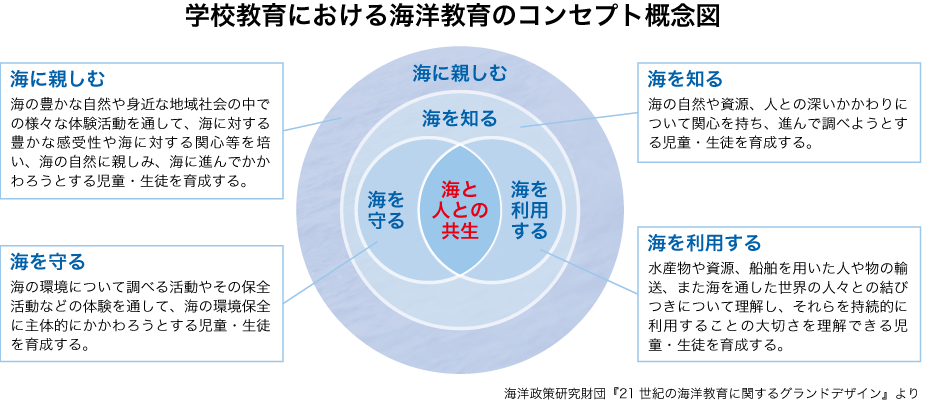- Announcements for middle and high school students
- Information for Middle and High School Researchers
- Information for Teachers
live with the sea
2020.10.08
In September 2015, the Sustainable Development Goals (SDGs) adopted at the United Nations Summit included the goal of "protecting the richness of the oceans," and the coexistence of the ocean and people has come to be seen as a global issue. In Japan, the Basic Act on Ocean Policy enacted in 2007, which preceded the SDGs, clearly states that the government is obligated to promote ocean-related education in school and social education. Furthermore, in 2016, the Japanese government declared that it aims to have marine education implemented in all municipalities by 2025. How should humanity interact with the ocean in the future? What should we learn, what should we pass on, and how should we face the ocean together? This report follows the forefront of marine education.
Basic Law for a Maritime Nation
The ocean is a gigantic environment where a tremendous amount of seawater (1.35 billion ㎦) travels around three-quarters of the globe in a continuous flow, nurturing more than 10 million species of life. Since ancient times, humans have utilized the ocean's bounty, mainly for food, and have built a culture that has lasted to the present day. However, rapid industrial development since the modern era has created global issues such as rising sea temperatures, sea level rise, plastic waste, and depletion of marine resources.
The Basic Act on Ocean Policy was enacted to provide an exemplary course of action on how to relate to the oceans, which has changed dramatically since the latter half of the 20th century. The Act aims to realize both economic development and the coexistence of the ocean and humankind. To this end, it is important to develop human resources who can think about their relationship with the ocean when considering the curriculum for marine education.
Basic principles set forth in the Basic Act on Ocean Policy
- Harmonize the development and utilization of the ocean with the conservation of the marine environment
- Ensuring marine safety
- Enhance scientific knowledge of the oceans
- Healthy development of the marine industry
- Comprehensive management of the oceans
- International Cooperation on Oceans
Spreading Ocean Literacy Around the World
So what exactly are the elements of ocean education that are considered important to learn? The United Nations Educational, Scientific and Cultural Organization (UNESCO), based on the Sustainable Development Goals (SDGs) adopted at the UN Summit, has identified the following seven elements as Ocean Literacy, and UNESCO and the UNESCO Intergovernmental Oceanographic Commission (IOC) are taking the lead in promoting the concept internationally. The following seven elements have been compiled as Ocean Literacy based on the SDGs.
This marine literacy has been disseminated to educational institutions around the world and is beginning to be integrated into education in a manner that is adapted to the culture of each country. So how is it being promoted in Japan? In Japan, the Grand Design for Ocean Education in the 21st Century was proposed by the Ocean Policy Research Foundation (now the Ocean Policy Research Institute) in 2007, but no concrete action was taken. However, the Great East Japan Earthquake of 2011 provided momentum for maritime education, and the revision of the Courses of Study in 2017 enhanced descriptions of the ocean and maritime affairs in social studies in elementary and junior high schools.
UNESCO Ocean Literacy
Seven Basic Principles
- The Earth has one huge ocean with diverse features
- Oceans and marine life shape the Earth's character.
- Oceans have a significant impact on weather and climate
- Oceans are making Earth a viable planet for life.
- Oceans support rich biodiversity and ecosystems
- Oceans and humans are inextricably linked.
- Much of the ocean is unknown.

Education for Living with the Sea
Currently, the Marine Education Center attached to the Graduate School of Education at the University of Tokyo and other organizations are working on the construction of a Japanese-style marine literacy system based on the marine literacy published by UNESCO. Surrounded by oceans on all sides, Japan receives more benefits and disasters than any other country, which is why it is necessary to provide marine education that incorporates perspectives on life, culture, and history unique to Japan.
The oceans are a vast and enormous resource that is intricately intertwined with human life. And as long as we continue to live on the earth, we will never leave it. This is why we need to learn about the oceans from multiple perspectives and consider a new kind of education to pass them on to the next generation.
(Text by Yuzen Kodama)
*Reprinted from "Education Support vol. 46
